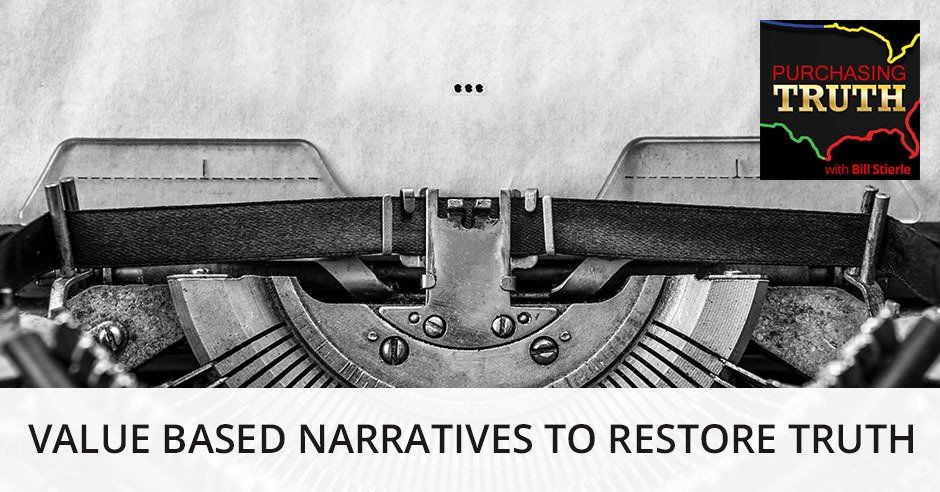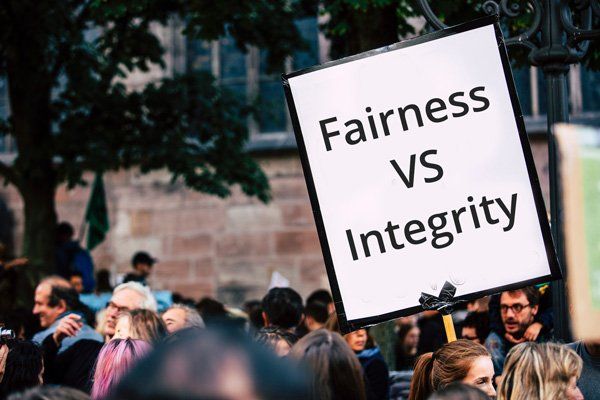Value Based Narratives To Restore Truth
Subscribe Today!
People naturally cling to an environment where their beliefs are shared and they feel safe. When people hear someone telling a narrative based on a value that they believe in, they unknowingly move closer towards the person. Bill Stierle and co-host Tom discuss how this type of narrative is being used in politics and how it can be used even better. Bill talks about a strategy on how to make people take you seriously. He clarifies the distinct difference between what context is, as compared to what subtext is, and how to make use of them effectively. They elaborate on some maneuvers that political candidates could be using in order to gain favor and set a firm ground to stand on.
---
Watch the episode here
Bill, we set up last time that we were going to talk about value-based narrative and we were trying to find a path toward restoring the truth. I’m excited to pick up there.
I appreciate this topic because there’s a big difference between context and subtext. The context is the high vibration of words that people speak. That’s what context is. It’s the vibration of explanation. It’s the vibration of problem-solving. It’s what you and I are doing right is explaining, problem-solving and getting some analysis. Those vibrations are good but they’re not as strong as a subtext vibration, which is how do you talk about what integrity looks like in government. How do you talk about what fairness looks like in government? What does the need for mutual respect look like? How does cooperation show up between people? Notice that as soon I picked and chose different vocabulary and started speaking in subtext, all of a sudden it became serious. That’s what a value-based narrative does. It makes it serious, but it also makes it stick. The more you explain things and even the more you go after facts, it does not make it stick because the person picks as Kellyanne Conway would promote, an alternative fact.
An alternative fact is a partial belief or a partial truth that I get to amplify. That’s all an alternative fact is. It’s kind of true but it’s not really true. It’s the way a generalized joke about bald people is funny. It’s kind of true, but it’s not really true. It’s like a generalized joke about a bald person might be that they’re so smart that their hair can’t even stay in their heads. It’s funny. I made myself smart all of a sudden by this alternative fact that I created. What happens in the language in politics is that there’s a truth that gets hijacked because it’s partially true. Let me go ahead and do this one truth. The United States doesn’t want to be in endless wars. I’ll vote for that.
I’ll vote for us not being in endless wars. I won’t vote for being in endless wars at the expense of integrity with an agreement, with the people that I have been fighting. I said I’m going to be there for you because you got slaughtered once before by Saddam Hussein with gas. Now, we’re going to open you up to get slaughtered by Syria? No. We made a commitment to you last time that we weren’t going to let this happen again. Meanwhile, we voted in the guy that says, forget about being in endless wars, the first things I’m pulling back on is that I can prove I have a commitment to my voters. I don’t want that and neither do the people that voted for you. It’s more complex. Yes, I’ll agree with the overall truth. The overall end of endless wars.
The endless wars and all this expense and lives lost. The vast majority of Americans would say they don’t want to be in an endless war. Everybody would agree with that. However, now that the president has abdicated responsibility for Northern Syria, pulled our troops back and letting everything that might have to happen happened, not only are these people unprotected. Now, we’ve got these camps that have all these ISIS detainees who are about to be freed. You’ve got a whole other problem that our military had solved in terms of ISIS and we’re going to be opening up Pandora’s Box over there it seems.
Context is the high vibration of words. It’s the vibration of explanation, problem solving, and analysis.
CLICK TO TWEET
The disheartening part about that is that at the end of World War II or even World War I, I can’t remember one where the line was drawn. There was a territory in Northern Iraq. It was this territory. It’s this round territory and the Kurds all lived in this one round territory. The mapmakers drew a line between that entire group of people called one of them Turkey and one of them Iraq. The mapmakers did it. The Kurds are on two sides of the boundary. We have this round area that we’re all in. We can’t trade and transport around these things because you called one of them Iraq and one of them Turkey. Donald Trump said the truth, “It’s a long fight regarding land. It’s land over there.” The answer is, it’s land that you need to do some creative mapmaking to make it work.
If there were some people and there are smart people around, it’s like this entire circle I put my hand around, there’s a whole bunch of oil underneath the circle. They put a line, half of it is on Turkey’s side, half of it is on Iraq’s side. That’s their land they put a line through. They were there long before the line was there. If I were to give some people some perspective, as you and I strive to do, this is one of those deals that need to be struck over time, not something that is stuck right now. It’s like the Hong Kong deal. What’s the Hong Kong deal? In 30 years, 50 years, 100 years, China can have Hong Kong back. From 1995 through 1999, there was a transition for it.
It’s not to be a part of England, but for it to be docked to a part of China. Are they creating problems? Yes, it is. You got two different belief structures running into each other going like, “We appreciate our free expression, please don’t mess with that. We don’t like free expression because free expression creates too many variables that we don’t like so much because we like the authoritarian state that we have over here in China.” It creates problems in the distant future but it can create peace in the current moment which is here’s what the Kurdish State needs to look like. No one’s saying the Kurdish State.
No one talks about that. They’re just people.
They’re a people that some map maker drew a line between. Half of their people were in the North, and half of their people are in the South. They haven’t liked it and they’ve been living with the line that somebody else drew for them. They didn’t care. They’re going like, “Who cares about a line? We’ve always been able to do that.” As those nation-states grew, Iraq and Turkey, they’re going like, “No we’re living inside the line that the people drew because this is the line we have. We’re on this side, they’re on that side.” It’s very troublesome.
When we take a look at politics and truth and a value-based narrative, their value-based narrative in that situation would look like an identity for the Kurds would look like of them having their nation. There is not one sentence that’s out there like that, not even one in the marketplace. That’s a part of the way out. Like the Palestinian and Israelis, they got the same problem. Somebody drew a bunch of lines, “We live here. We want our state.” “You own state inside our nation?” “We don’t want that. We want the whole nation. We want this whole area. We don’t want two different parts of the state because there are two different people here.”
Isn’t it interesting? The value-based narrative, when you talk about those values, it does get to the heart of the real problem, doesn’t it?
Yes.
Whether you’re talking about the people of Hong Kong who are fighting for their continued freedom that they feel are going to be oppressed or lost as China assimilates Hong Kong into the one China. The value-based narrative is very interesting but I wonder if we pivot more to domestic US issues, also if there are some things we can see there.
I’m glad you mentioned that because we can.
It seems to me that the Republican Party is the most obvious thing to look at where the value-based narrative has been lost. Would you agree with that?
It’s a great place to pivot to because the Republicans need an off-ramp right and they don’t have one. They have no way to separate or include the Trump voter without running over the Trump ideology. They have no way to get off of and still include the Donald Trump voter to still vote for them. They need a way to get that voter to still vote for them because that voter is going to be left in limbo land here in a little bit. They’re going to go like, “I don’t know who to vote because you got rid of my guy.” If the twenty senators vote with integrity and vote for what they took an oath to, he should be out. It says that in plain day, you can’t exaggerate and spin this one. As one famous Fox News person says, “He exaggerates and spins.” There’s no exaggeration. There’s no spin. He made a bribe, a deal and arm-twisted a foreign leader. That’s what he did and also enriching his campaign with foreign donors. There’s no exaggerate and spin on this. None.
Sure, but even if you could, because Donald Trump is your guy, you’re going to overlook that to an extent. It seems this erosion of the Republican Party values over time of fiscal responsibility. I take that one of integrity, which Donald Trump is stumped on, “I’m not releasing my tax returns.” This is why Paul Ryan left the House of Representatives, he ran on, “We’re not going to spend new money unless we cut it from other places. Now, the current administration is needing to print $1 trillion more in the current fiscal year in order to keep the government running. This whole idea of fiscal responsibility has been abandoned because of the occupant of the White House.
If I want to purchase the truth regarding that, it’s, “Here’s what the new fiscal responsibility looks like. It is adjusting our economy to regrow the middle class the way we did in the 1950s. We want to regrow the middle class and do some things in that space so that we can regrow the vibrant economy that we would like to experience again. What does that mean? I can buy a new refrigerator because I’m in the middle class. I’m not stuck with this. If I’m a lower middle class, I cannot as much live from paycheck to paycheck. I can save a little bit of money so I could take a two-week vacation,” which most people don’t do. They can’t afford to take a vacation. Let alone the business center being cash-flushed enough in order to be able to say, “I’ll hire a new staff while you take a vacation because you’re going to be better off when you get back here.” Your mental health is good. You’re not going to get sick. You’re not going to be a working robot 24/7. I am in the service industry. You can’t take your two-week vacation because you’ve been here a year.
Fiscal responsibility has to include people. It doesn’t have to include members. It has to include what the impact is going to be with fiscal responsibility. It is not an Excel spreadsheet with a blue bottom line and numerical bottom line sitting there. What does Russia stand for? It stands for the ability to have power over people. It’s got a very monolithic economy regarding oil. It’s so thin. It has no diversity in it. It’s like, “Are we going to have our rich people be those the businesses they want to run become this? Are we going to allow people’s creativity and vision and entrepreneurialism to work? Are we not doing entrepreneurialism anymore?” This is where the truth is. We’re not doing, and we’re not feeding, and we’re not developing entrepreneurialism and entrepreneurial skills.
It seems that there are some cracks within the Republican Party. Maybe factions may be starting to form, especially Mitt Romney who is in a unique position to be somewhat immune from the wrath of President Donald Trump, which is the issue here. Every republican is abandoning their core values or some at least, of their core values because they do not want Donald Trump to turn his flamethrower on them. Some of them are running for election in 2020 and they’re worried about self-preservation, whereas Mitt Romney is not up for election until 2024. He’s immune to this and working with lots of people to try to repurchase truth for the Republican Party and for the people of America. What do you feel about that?
Yes, there is and he’s walking very cautiously. One of the reasons why Mitt Romney wasn’t able to be or didn’t become president is he didn’t stand for the broader values that Barack Obama did. The broader values are, “We’re going to collaboration and cooperation. We’re going to work with you even though you were a pain over the last four years.” They resisted everything that Barack Obama did for literally two years. They stonewalled him with voting. They said, “We are not doing anything.” Foot in the ground, foot on the brake, we’re not moving. They weren’t in the place of collaboration.
Even though they were in that place, Barack Obama was making concessions along the way to try to get things done. Even though Mitch McConnell get him and he didn’t vote on things, he still said, “Here’s what the best interest is in the nation. We’re going to move forward those even though they are going to stonewall. We’re going to keep voting on things and we’re going to keep putting things up, things that are popular enough that I get to sign an executive order about it. Let’s see what you can do about that?” That turned around and all the executive orders are written in the opposite way, which is not the way the government is supposed to work. It’s a situational consequence of our current non-collaborative, non-cooperative environment. Tom, try to run a business if you don’t build cooperation and collaboration with your team.
It’s impossible.
Try to run that business.
You can’t.
The thread of the angry eighth grader, I’m going to call it a label here so you and I can laugh a little bit and the audience can laugh a little bit. What did an angry eighth-grader do when a parent tells them not to do something? They figure out how to do it and/or they’ll stop. Watch how weird this gets, an angry eighth-grader will stop cold, not do things in their own best interest to prove a point to their parents that said, “No.” That’s what an angry eighth-grader does.
The Republican Party is the most obvious place to look at where the value-based narrative has been lost.
CLICK TO TWEET
That’s where you get counter-productivity, don’t you?
Right. How old is an angry eighth-grader, 13, 14 years old? What does an angry eighth-grader talk about? “This is not fair.” Who’s not fair? China is not fair. Who’s not fair? The Democrats are not fair. Who’s not fair? Ukraine for not investigating because they have that corruption over there. Joe Biden has done something. They’d investigate it, been there, done that and not in alignment with the way you want to create fairness, which in fairness to do whatever you want like a 13, 14-year-old. I know I’m putting it in an age group. I know I’m putting myself out as a target to go like, “You called the President a 13 or 14-year-old.” That’s not what I’m talking about. It’s that his fight for fairness is not balanced with the need for integrity. His fight for fairness is not balanced with the identity of an adult. An identity of adult knows that they have to give and take that they can’t get everything they want every single time. Again, try to raise children.
Anybody that has experience raising children understands this age reference or correlation. Call it a label, it might be a fair way to talk about it. If you’ve ever had children and raised teens or pre-teens, you know exactly what happens.
The modeling of authoritarian power and/or parent gets what they want. They put their hands down. They get to get angry about stuff. The kids hide in the corner with mom until dad calms down a little bit and everybody has to submit to dad’s way. That’s the way an authoritarian works. It’s the same thing. That’s a little bit of what’s problematic here. The republicans need to get back to a narrative of a strong voice that is an adult parent. A part of their off-ramp where they need to go and more importantly also what the democrats deem to become clear on. Joe Biden needs to be clear that not only he’s the nice guy, but he’s the nice guy that doesn’t have to put his foot down in anger, but puts his foot down in passion to say, “We will stand for this.” His message has got to be focused around what the need for integrity regarding a commitment is.
The president does not honor the commitments that Americans and American Presidents have made in the past. He’s looking to change those commitments to a commitment that is not based on integrity and full fairness. By putting his foot on the ground like this, the authoritarian parent, all the have to do is do a waiting game. Can you guess what Russia and China are doing? They’re waiting and letting the teen make wreckage of things. That’s all that’s happening is the implosion of a 13-year-old to 14-year-old with nowhere else to go, not only are they going to have the impeachment label as the bully president. They’re also going to have a wonderful experience if they wind up getting prosecuted this way. The leader will be the first leader to get indicted on criminal charges once they have left the White House if the administration that is after that pursues that line. It’s a little scary to pursue that line because there are so many people that have bought into his version of the truth and have been bought the Fox Media’s version of their truth as Democrats are evil socialist.
If the democrats do occupy the White House in 2021, it would probably best to show compassion and somehow try to heal the nation and move forward. What’s interesting is that what I’m hearing from you is this value-based narrative, not only is it the path or certainly a good path for the republicans who have been hijacked within their party by Donald Trump, to defend themselves and restore their part. Also, not let Donald Trump completely take their party in the direction that’s not in alignment with their values. Also, the value-based narrative is the path for the democratic challengers to come be the heroes restoring America, maybe taking over the White House in 2020. I don’t know that either of the establishments in the Republican Party or the Democratic Party or the candidates running get that yet.
They don’t know how to use passion as a shield. A passionate needs-based narrative is a shield for the flamethrower of anger. If I’m doing a high conflict mediation and I have somebody and I’ve had many people, stand in front of me, point at me and scream at me.
They would scream at me at a city council meeting. I’m using a value-based shield and their anger is coming and it hit me. It’s like the fire breathing dragon. As soon as the full flame runs, say, “Mr. Jones, you’d like a choice in this and you notice that choice wasn’t processed fully by the city council, is that correct?” He would say, “Yes.” “You like fairness to hear your voice fully, is that correct?” “Yes.” I’m using a needs-based narrative. He yelled and screamed at me and called me all kinds of stuff. He went off and did his anger piece. It was important for him to get his anger moving. I held a shield up and provided some compassion and some empathy for how much pain he was in.
Tom, that’s where we can pick up next time is, how to use this anger and this passionate shield of a value-based narrative to stand in there. The Trump voters are going to be very helpless and very angry at the end of this. I don’t want them to be either place. They don’t need to stay there. They put their money down and they put their vote down on this person. His version of the truth, which is a good truth, endless wars are not a good strategy for a nation. He’s right about that. The amount of money we spend on endless wars is not. A lot of our economy is wrapped up in that model. We have to do the truth about that is that we have to build a more diverse middle-class model of entrepreneurialism so it’s not thin the way China or Russia is thin. They have theirs but our economy is built on building war machines as if that’s a good strategy.
That opens up that whole can of worms there, too.
It’s a good place for us to pick up next time, Tom.
It sounds great, Bill. Thanks so much.
Thanks.
Love the show? Subscribe, rate, review, and share!








